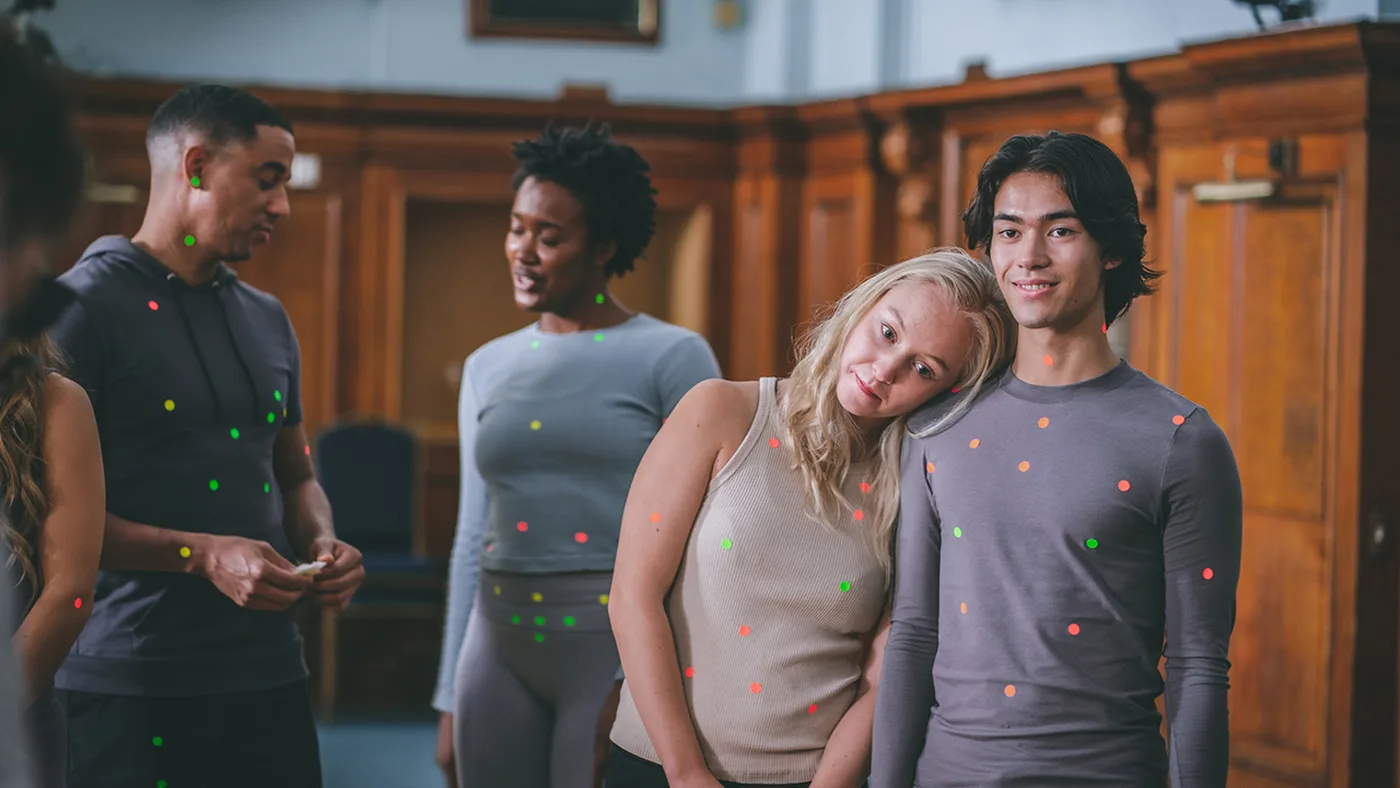
Interview: Love, Algorithms and Ted Lasso Intersect in Pragma
Film Interviews

“We teach you to stand in love, not fall into it.” That’s the motto of the fictional Pragma Institute, which is dedicated to creating lasting relationships. Potential couples are algorithmically matched and go through an extensive—and hilarious—series of compatibility tests in Pragma, a short film from the creative team of Lucy Heath, Ellie Heydon and Phil Dunster. This clever and amusing British comedy is making its world premiere at the Tribeca Film Festival on June 10.
“Phil and I are old friends,” Heath says, explaining that she and the SAG Award–winning actor, who plays footballer Jamie Tartt on the AppleTV+ hit Ted Lasso, went to high school together. “We were interested in Alain de Botton and obviously Brené Brown and Esther Perel and people like that. We were reading their books at the time about love and romance,” Heath says, “and we sort of had an idea that we wanted to make a film that would discuss the subject.” Heath and Dunster became busy with other projects the inspiration hit years later. “I saw this TED Talk by a woman who created a 72-point algorithm to find her perfect match, and it worked completely,” Heath says. The thought of extending dating apps into relationship education came to Heath. “What would it look like if our hands were held past the point of being matched, and we were then trained on how to be in a relationship as well?” she says.
“The exploration and language and mining of romantic relationships had been very normal discourse in my family. The notion of boundaries doesn’t really exist.”
The idea ignited something in her, and Pragma was born, with Heath not only writing the script but acting as well, and Ellie Heydon directing the film. Heath stars as Willow Leon, a woman in the program who has been matched with Tom (Sid Sagar, Belfast) but finds herself drawn to Jack (Dunster), a man with whom the algorithm says she is incompatible—yet there is an undeniable spark between them.

“In the arts, we’re taught … what the big love is,” Heydon says. “This sort of fiery, passionate love, and I’m just so much more interested in a love that’s constant and stable and warm, like the ocean rather than like fireworks.” Heydon is an accomplished actress who is perhaps best known to American audiences as Anne Pettifer on the Hulu series Harlots. The subject matter of Pragma was decidedly familiar territory for the talented director. “My mum is a sex and relationship therapist,” Heydon says. “The exploration and language and mining of romantic relationships had been very normal discourse in my family. The notion of boundaries doesn’t really exist.”
Phil Dunster plays a leading role not only in front of the camera, but behind it as well, acting as a producer on the film along with Fay Mohamed, the production coordinator on Ted Lasso. “I had such a wonderful experience on that show,” Dunster says. The connection to the multiple Emmy–winning series proved to be invaluable in terms of bringing top-quality industry talent on board Pragma, from key grip Roman O’Toole-Howes and costumer India Millar to Jason Sudeikis himself, who stepped in as executive producer. The cherry on top was Nick Mohammed, who plays assistant coach Nathan Shelley on Ted Lasso, joining the cast of Pragma in the scene-stealing role of Dr. Francis, who administers the compatibility tests. “The enthusiasm he brought to it, and the way that he wanted to make sure that he was exacting Ellie’s vision, was joyful,” Dunster says. “I mean, he didn’t have to do this. He did it because he wanted to. He has care, and he’s so kind.”

Though directing a screenwriter as the lead actress in her own script could have been daunting, Heydon is happy to say that the experience couldn’t have gone more smoothly. “Directing Lucy is just such a joy, and I hope I continue to do so for the rest of my life,” Heydon says. This comfort level also helped with the fact that Heydon was directing Heath playing a romance opposite Dunster, Heydon’s own romantic partner in real life. As long-time close friends, Heath and Dunster had an on-screen chemistry between them that was so strong that some people mistook it for the real thing, including cinematographer Simona Susnea. “While they were shooting, she leaned over to me and said, ‘Do you think these guys are shagging?’” Heydon says. “At the time, nobody knew that Phil and I were together, and I was like ‘Well, I’m hoping they’re not.’” Heydon had fun playing with this dynamic, and she even added a kiss that wasn’t in the script.
“What would it look like if our hands were held past the point of being matched, and we were then trained on how to be in a relationship as well?” Heath says.
While the concept of a feature version was considered, Heath and Heydon opted instead to make Pragma a series.. “We could really explore so many fascinating dynamics,” Heath says. “We could follow the arcs of lots of different people, including the staff. And that excited us more than just the one main narrative,” Heath says.
The trio will be part of the creative market at Tribeca, pitching the show to power players in the entertainment industry. While the short film takes its bow before audiences this weekend, it promises to be only the beginning of the Pragma story.
Read more interviews conducted by Patrick Gibbs:
Interview: The Politics, Corruption and Comedy of 18½
The World is a Dangerous Playground in Eskil Vogt’s The Innocents